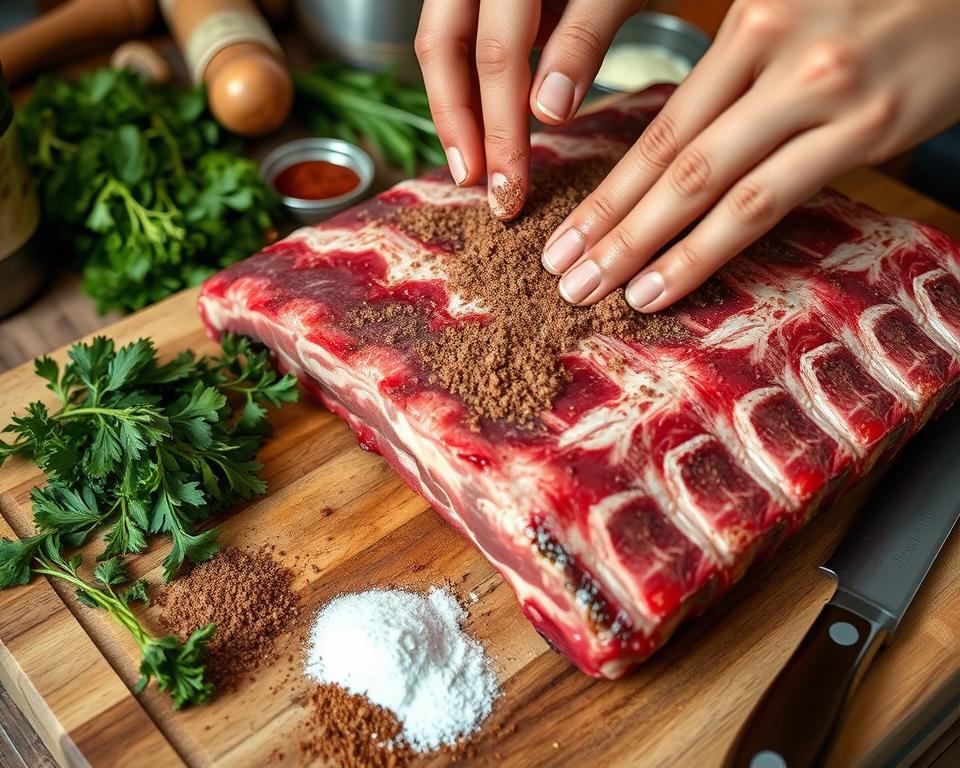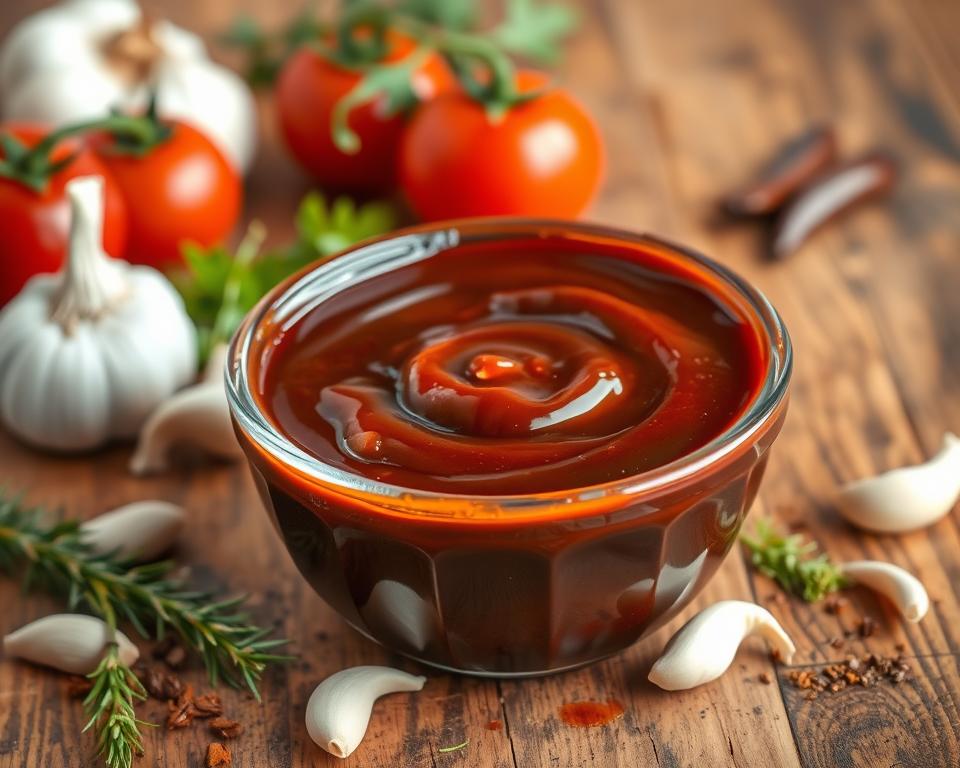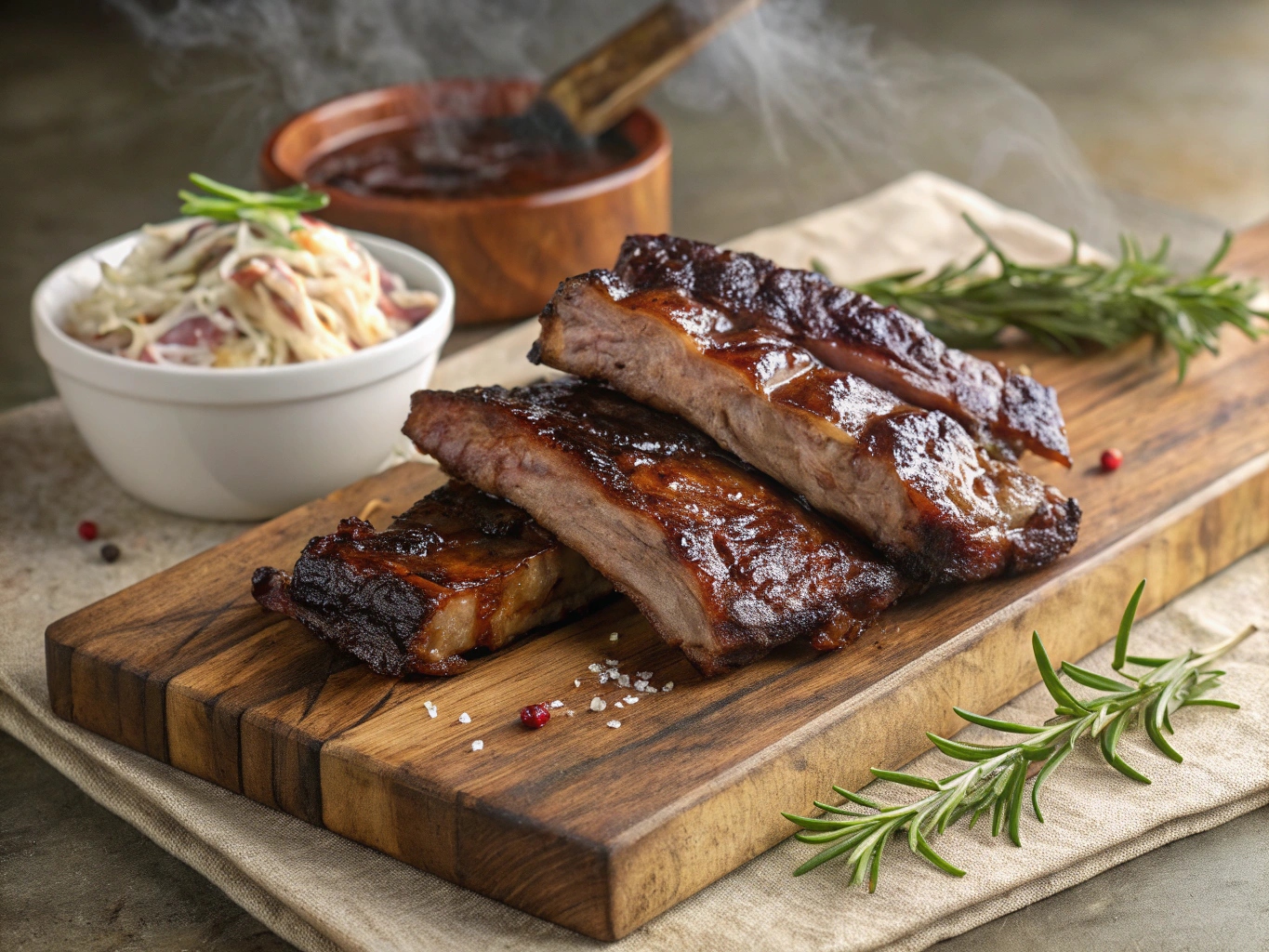Imagine a lazy Sunday afternoon. The kitchen is filled with a delicious smell of slow-cooked meat. This is the magic of oven-baked beef back ribs. It turns a simple day into a special meal.
These tender ribs are perfect for anyone. Whether you’re a pro in the kitchen or just starting out, you’ll love them. They become your go-to comfort food.
Cooking beef back ribs is easier than you think. With a few ingredients and some patience, you’ll make a meal everyone will love. These ribs are more than a recipe. They’re a way to bring people together.
For more recipe ideas, check out our Creamy Garlic Pasta: A Delicious Dinner Delight.
Key Takeaways
- Beef back ribs are an affordable and delicious meal option
- Total cooking time is approximately 5 hours for maximum tenderness
- Each rack serves about 6 people
- Low and slow cooking method ensures fall-off-the-bone texture
- Simple dry rub creates incredible flavor profile
- Perfect for weekend family gatherings or special occasions
Understanding Beef Back Ribs: What They Are and Why They’re Special
Beef back ribs are a tasty treat for meat fans. They come from the cow’s upper rib section, near the loin. This makes them taste different from other rib cuts.
Anatomy of Beef Back Ribs
The anatomy of beef back ribs is quite interesting. They are what’s left after a butcher takes out the prime ribeye roast. You’ll find less meat on top but lots of tasty fatty meat between the bones.
- Located in the upper rib section near the loin
- Characterized by bone-in meat with marbling
- Typically less meaty compared to other rib cuts
Difference Between Beef Back Ribs and Beef Short Ribs
Knowing the difference between back ribs and short ribs can make you a better meat buyer. Back ribs come from the upper section, while short ribs are from the lower section near the belly.
| Characteristic | Back Ribs | Short Ribs |
|---|---|---|
| Location | Upper rib section near loin | Lower section near belly |
| Meat Density | Less meat on bones | Thicker meat layer |
| Flavor Profile | Rich, fatty between bones | Intense, beefy flavor |
Quality Indicators When Buying
When you buy ribs, look for locally raised beef with good marbling. Fresh, quality meat makes a big difference in taste and tenderness. Choose ribs that are bright red and have a smooth, moist surface.
“The secret to amazing ribs starts with selecting the right cut at the butcher shop.”
Pro tip: Keep your beef back ribs cold, below 40°F (4°C). Use or freeze them within 3-5 days to keep them tasty and safe to eat.
Essential Ingredients for Perfect Beef Back Ribs
To make delicious beef back ribs, start with the right ingredients. You need top-quality beef back ribs. For this recipe, get two racks, each about 2 pounds.
Key Ingredients for Rib Seasoning
The right rib seasoning is key for deep flavors. Your dry rub will have:
- 2 teaspoons smoked salt
- 1/2 teaspoon black pepper
- 2 teaspoons smoked paprika
- 1 teaspoon onion powder
- 1 teaspoon garlic powder
Rib Marinade Essentials
A tangy marinade makes your ribs amazing. Mix:
- 1/2 cup apple cider vinegar
- 2 tablespoons hot pepper sauce
Spread the marinade in three parts for full flavor.
| Ingredient | Quantity | Purpose |
|---|---|---|
| Beef Back Ribs | 2 racks (2 lbs each) | Main protein |
| Smoked Salt | 2 teaspoons | Seasoning base |
| Apple Cider Vinegar | 1/2 cup | Marinade liquid |
| Hot Pepper Sauce | 2 tablespoons | Flavor enhancer |
“The secret to incredible beef back ribs lies in the quality of your ingredients and the love you put into preparing them.” – BBQ Expert
Get ready to wow your guests with these special ingredients. A great rib seasoning and marinade turn your dish into a masterpiece.
Preparing Your ” beef back Ribs ” for Cooking
Getting your beef back ribs just right starts with careful prep. The right steps can turn good ribs into a memorable meal. Learning how to prep beef ribs will boost your cooking and wow your guests.
Membrane Removal Technique
It’s key to remove the rib membrane for tender, tasty ribs. First, find the thin, clear membrane on the bone side. Use a blunt knife to lift a corner, then grab it with a paper towel for better grip. Pull it off in one smooth move, making sure to get it all.
- Use a clean paper towel for better grip
- Pull the membrane at a 45-degree angle
- Remove in a single, continuous motion
- Check for any remaining membrane fragments
Proper Trimming Methods
When prepping beef ribs, do minimal trimming. Look for fat pockets or loose meat. Trim these with a sharp knife, keeping most fat for flavor and moisture.
Seasoning Application Tips
Seasoning beef ribs is an art that can make or break your dish. Apply your dry rub well, making sure it covers evenly. Rub the seasonings into the meat to let them soak in.
| Seasoning Technique | Benefits |
|---|---|
| Dry Rub Application | Enhances flavor penetration |
| Massage Technique | Helps spices adhere to meat |
| Resting Period | Allows flavors to develop |
“Great ribs start with great preparation” – BBQ Experts

Pro tip: Let your seasoned ribs rest for 30-60 minutes before cooking. This lets the spices soak into the meat, making the dish more flavorful.
The Secret to Tender Beef Back Ribs
Turning tough beef back ribs into a tasty treat needs special slow-cooking skills. The secret is knowing how heat breaks down tough parts.
Many home cooks find it hard to make ribs that fall off the bone. It’s not just about the seasonings. It’s about being patient and controlling the heat well.
“Great ribs are a labor of love, not a rush job.”
Here are the key techniques for making super tender beef back ribs:
- Keep the temperature steady at 250°F
- Cook for a long time—usually 4-6 hours
- Keep the meat moist to avoid drying
- Let the ribs rest well after cooking
The 3-2-1 method is a big hit for backyard grill fans. It involves:
- 3 hours of initial smoking
- 2 hours wrapped in foil
- 1 hour of finishing and glazing
Remember, slow and steady wins the race for tender beef back ribs. Your patience will pay off with meat that’s almost like butter.
Step-by-Step Cooking Process ” beef back Ribs “
Cooking beef back ribs needs care and patience. The right steps make these tasty cuts a hit with everyone.
Initial High-Heat Searing
Begin by heating your oven to 250°F. This slow cooking makes the meat tender. A quick sear before baking adds flavor:
- Pat ribs dry with paper towels
- Season generously with your favorite dry rub
- Sear ribs quickly in a hot skillet for 2-3 minutes per side
Low-Temperature Cooking Phase
For tender ribs, cook at a low temperature. Put the seared ribs on a baking sheet. Cook for about 3-4 hours.
“Low and slow is the golden rule for perfect beef back ribs.” – Professional BBQ Pitmaster
Final Glazing Process
Glazing ribs makes them extra special. Brush with BBQ sauce in the last 30 minutes. This makes the outside sticky and tasty.
Pro tip: Pick a glaze that matches the ribs’ flavor. Sweet and tangy is the best mix.
Creating the Perfect BBQ Glaze

Turning your beef back ribs into something amazing starts with a great BBQ glaze. A homemade rib sauce can make your cooking go from good to great. It will impress everyone at your backyard barbecue.
When glazing beef ribs, it’s all about finding the right mix of flavors and timing. Your BBQ glaze should blend sweet, tangy, and savory tastes. These should enhance the rich flavor of the meat.
Essential Glaze Ingredients
- 1½ cups ketchup
- ½ cup apple cider vinegar
- ¼ cup brown sugar
- 2 tablespoons yellow mustard
- 1 teaspoon smoked paprika
To make the ultimate homemade rib sauce, mix these ingredients until smooth. This blend offers a perfect mix of sweet and tangy. It will make your ribs hard to resist.
“The right glaze can transform ordinary ribs into a culinary masterpiece.” – BBQ Pit Masters
Glazing Technique Tips
- Apply the glaze during the last 10-15 minutes of cooking
- Brush multiple thin layers for maximum flavor
- Avoid applying too early to prevent burning
Pro tip: For an extra flavor boost, try adding a bit of bourbon or some ground cumin to your BBQ glaze. Your taste buds will love it!
Tips for Achieving Fall-Off-The-Bone Texture
Creating fall-off-the-bone ribs needs care and patience. You must watch the temperature closely, know when they’re done, and let them rest. This makes the ribs tender and delicious.
Precise Temperature Control
To get fall-off-the-bone ribs, cook at a low temperature. Keep it between 275°F and 300°F. This slow heat breaks down the tough parts, making the ribs soft and tasty.
Resting Ribs: The Secret Weapon
After cooking, resting ribs is key. Let them rest for 10-15 minutes. This lets the juices spread evenly, making the ribs tender and flavorful.
Doneness Indicators
Checking rib doneness is more than just temperature. Look for these signs:
- Meat easily pulls away from the bone
- Caramelized exterior with a rich, golden-brown color
- Internal temperature reaches at least 190°F (88°C)
“Patience transforms good ribs into extraordinary ribs.”
| Cooking Stage | Temperature | Time |
|---|---|---|
| Initial Cooking | 275°F-300°F | 3-4 hours |
| Resting Period | Room Temperature | 10-15 minutes |
| Target Internal Temp | 190°F (88°C) | Until reached |
By sticking to these tips, you’ll make ribs that are tender and full of flavor. They will be the perfect fall-off-the-bone ribs.
Complementary Side Dishes and Pairings
Creating a balanced rib dinner needs careful side dish choices. Your beef back ribs need friends that make their smoky taste better. They should also add different nutrients.
Think about sides that mix textures and tastes well with the meat’s bold flavor. Fresh, lively sides can make your meal lighter and more balanced.
- Roasted seasonal vegetables
- Crisp green salads
- Tangy coleslaw
- Creamy potato dishes
For classic pairings, traditional choices are always a hit:
- Baked beans with bacon
- Buttery cornbread
- Creamy potato salad
- Grilled corn on the cob
“The right side dish can elevate a good rib meal to an unforgettable dining experience.”
Choosing the right drink is key to a great meal. A bold red wine or a crisp craft beer can match the strong taste of beef back ribs perfectly.
| Side Dish Category | Best Pairings | Flavor Profile |
|---|---|---|
| Vegetables | Roasted Brussels sprouts | Caramelized, slightly bitter |
| Starches | Garlic mashed potatoes | Creamy, rich |
| Salads | Apple slaw | Tangy, crisp |
The aim is to make a balanced rib dinner that pleases everyone. Try different mixes to find your favorite meal!
For more recipe ideas, check outSteelhead Trout Bake with Dijon Mustard.
Conclusion
Making perfect homemade ribs is more than cooking. It’s an art that turns a simple meal into a special experience. Your beef back ribs recipe is a delicious journey from start to finish.
Great ribs need time and care. Start by picking good meat, removing the membrane, and seasoning well. Slow cooking is key to tender, tasty ribs.
Storing leftover ribs is easy. Just refrigerate them for 3-4 days and reheat gently. Each time, you’ll get better at making them. Cooking is a skill that grows with practice and passion.
Your beef back ribs journey is about making meals that bring people together. With patience and these tips, you’ll make amazing ribs. It’s all about enjoying the flavors of perfectly cooked ribs.

